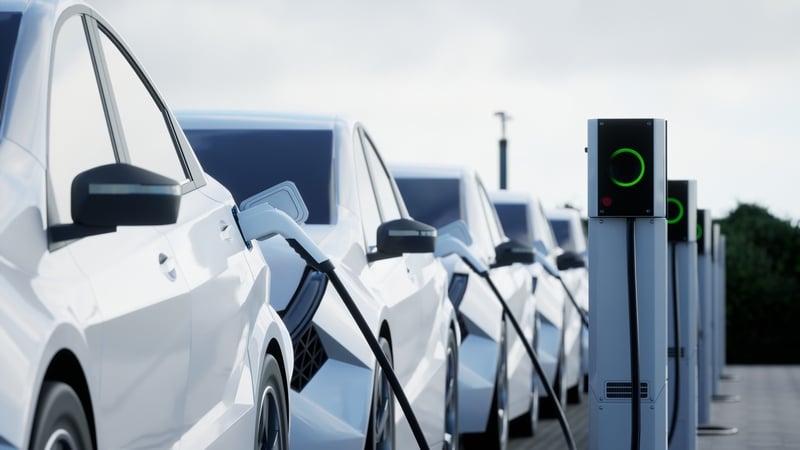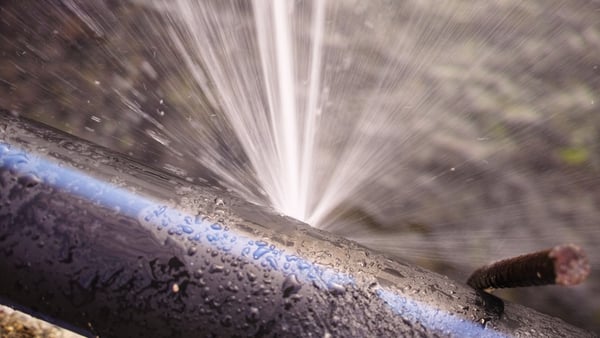Electric car prices would need to halve to ensure they are adopted by the mass market, according to the European Court of Auditors.
The court also said in a new report that the EU may have to review its decision to ban the sales of internal combustion engine cars from 2035.
Europe's ability to secure the battery supply for its transformation to e-cars is woefully at risk, according to the report.
It said if this is not resolved, Europe will have to depend on massive imports from China to the detriment of the European car industry and its more than three million jobs.
Around 15 years ago, the EU started to take action to force car manufactures to produce more energy efficient cars with significantly lower carbon dioxide emissions.
However, the study by the ECA has found that those efforts have so far failed to deliver any "real-world" reductions in CO2 from new cars.
What has happened, according to the research, is that all the gains in car engine efficiency achieved have been cancelled out because cars have been made on average 10% bigger, requiring a 25% increase in engine size to power them.
EU climate goals 'unreachable' - ECA member
"We are forced to acknowledge that, despite lofty ambitions and strict requirements, most conventional cars still emit as much CO2 as 12 years ago," ECA member Nikolaos Milionis said.
"The EU’s climate goals are simply unreachable without tackling emissions from cars, yet almost three quarters of new registrations continue to emit the same quantity of CO2 as they did 12 years ago," he added.
The ECA said that as things stand, electric cars are the only viable option to achieve a zero-emission car fleet because alternative fuels, including biofuels and hydrogen, are not credible reliable successors to petrol and diesel on a large scale.
To engineer a rapid reduction in greenhouse emissions from the transport sector, the EU has introduced what amounts to a ban on new petrol and diesel cars from 2035 onwards.
However, the ECA pointed out that this poses some very significant challenges, with several obstacles to be overcome before the target can be achieved.
A lot more electric cars will have to be sold in the EU at a time when the 27 member states are struggling to speed up the transition to electric vehicles.
"The road ahead is full of potholes. To put it bluntly, Europe is facing a conundrum: how can the Green Deal satisfy our climate objectives without harming our industrial policy and increasing costs for European consumers at the same time?" ECA member Annemie Turtelboom asked.
Europe lagging behind China
The ECA highlighted that Europe is lagging behind on electric car battery production, accounting for less than 10% of global supply compared to 76% in China.
In addition, the vast majority of battery production taking place in the EU is being done by non-European companies.
One particular speedbump for the EU’s battery industry is an overwhelming reliance on imports of resources from third countries with which it does not have appropriate trade agreements.
For instance, 87% of Europe’s raw lithium imports come from Australia, 80% of its manganese comes from South Africa and Gabon, 68% of its cobalt from the Democratic Republic of Congo, and 40% of its graphite from China.
Ms Turtelboom said the race for the raw materials needed to produce enough batteries is creating a dependency which, as our experience with Russian gas has shown, could backfire.
She said: "While it is true that Europe does have potentially unexploited mineral reserves, these may take up to 16 years to bring online.
"16 years that Europe cannot afford to wait. Europe’s ability to secure its battery supply is therefore woefully at risk.
"The EU must reconcile its Green Deal with its industrial policy and economic sovereignty.
"Otherwise, the 'e-car revolution’ in Europe will depend on massive imports from China, to the detriment of the European car industry and its more than 3 million jobs."
Battery prices need to halve, ECA warns
The ECA believes electric cars are simply unaffordable for the wider population and need to be made far more affordable to win over the mass market.
To achieve this however, it said battery prices, which are currently averaging €15,000 per car in Europe, would need to halve.
It warned that the EU faces an uphill battle to turn things around in the space of just a few years.
The European Commission is due to reassess the situation with regard to its electric vehicle strategy in two years’ time, in 2026.
If necessary, it can adjust the schedule for the sales ban on new petrol and diesel cars at that stage.
It will also have to determine whether the 2025 objective of having 13 million electric cars on the roads in the EU has been achieved.
Ms Turtelboom said lofty ambitions often come with major costs.
She said: "By banning petrol and diesel cars from 2035 onwards, Europe has embarked on a long and winding road.
"In order to find its way, the EU must provide an answer to the two dilemmas it faces: how to reconcile the Green Deal not only with industrial sovereignty, but also with affordability.
"It must find a convincing answer if it wants to achieve its ambitions and make its policy a success."






